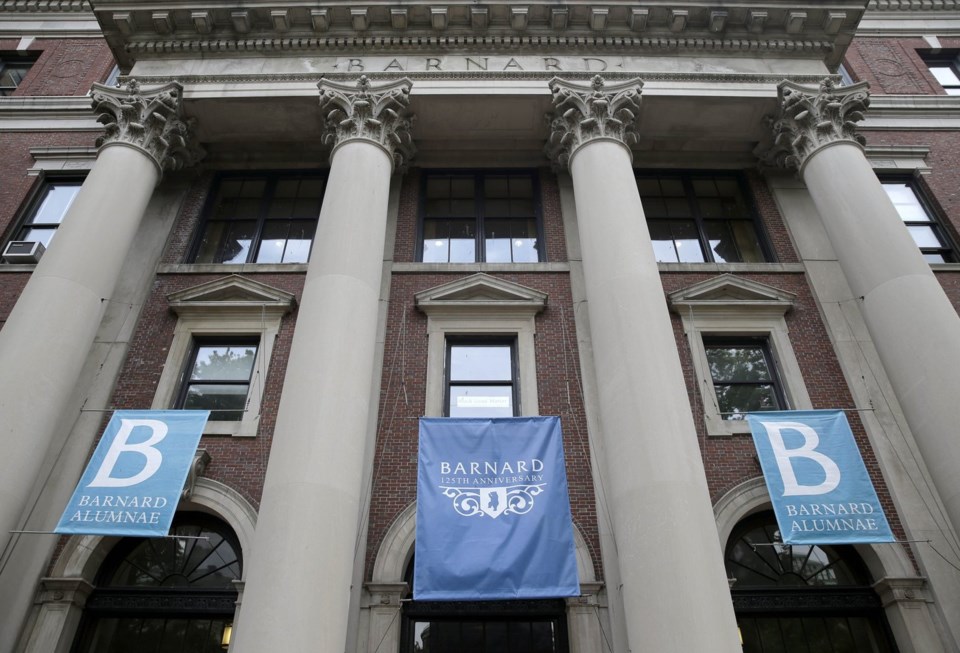NEW YORK (AP) — Barnard College has settled a lawsuit that accused the college of not doing enough to combat antisemitism on campus, agreeing to a litany of demands that include banning masks at protests and refusing to meet or negotiate with a coalition of pro-Palestinian student groups, according to a statement released Monday.
The Manhattan college, an all-women’s affiliate of Columbia University, will also establish a new Title VI coordinator to enforce against claims of discrimination. Beginning next semester, all students and staff will receive a message conveying a “zero tolerance” policy for harassment of Jewish and Israeli students.
The settlement was announced in a joint statement by Barnard and lawyers for two Jewish advocacy groups, Students Against Antisemitism and StandWithUs Center for Legal Justice, who brought the lawsuit last February on behalf of some Jewish and Israeli students.
In the statement, Barnard’s president, Laura Ann Rosenbury, said the agreement “reflects our ongoing commitment to maintaining a campus that is safe, welcoming, and inclusive for all members of our community.”
The terms of the deal also drew immediate pushback from some students and faculty, who accused the university of capitulating to a legal strategy aimed at stifling legitimate pro-Palestinian activism on campus.
“This settlement appears to equate criticism of Israel with antisemitism,” said Nara Milanich, a Barnard history professor who is Jewish. “That is a problem for critical thought and academic freedom.”
As part of the agreement, the college will adopt contentious federal guidance to “consider” the International Holocaust Remembrance Alliance’s definition of antisemitism and its examples, which include certain critiques of Israel.
A newly-appointed Title VI coordinator will oversee compliance with the policy and produce an annual report on antisemitism for university leaders.
Additionally, the university’s leaders agreed not to recognize, meet or negotiate with Columbia University Apartheid Divest, the coalition behind last spring’s student encampments. The group has called on both Columbia and Barnard to sever ties with companies that do business with Israel.
As part of the deal, the university will also affirm that its endowment will not be used for expressing political positions, including “taking actions for the purpose of penalizing the government of a country or the commercial/financial activity within that country.”
The agreement follows a federal lawsuit brought last February that accused Barnard and Columbia of allowing Jewish and Israeli students to be “bombarded” by antisemitism during protests that erupted against Israel’s military campaign in Gaza.
The litigation against Columbia remains ongoing — though the university has already agreed to revamp its policies around protests, among other concessions made under threat from the Trump administration.
New York University and Harvard University have entered into their own legal settlements following lawsuits focused on antisemitism.
In the lawsuit against Columbia and Barnard, Jewish and Israeli students said they were subject to unchecked harassment during protests by “mobs of pro-Hamas students and faculty.” Those who participated in the protests, including many Jewish students, have strongly disputed that characterization.
The lawsuit also claimed that students who served in Israel’s military were singled out, with some left “overwhelmed and unable to concentrate in class” after encountering signs accusing Israel of committing genocide and social media posts from fellow students.
Starting next semester, students will be reminded that they can be subject to discipline for off-campus conduct, including social media posts.
Barnard will also restrict where, when and how students can protest. And the university will ban face masks at demonstration used to “intimidate or interfere with the enforcement” of school policies.
“Barnard’s commitment to take meaningful actions to combat antisemitism demonstrates its leadership in the fight against antisemitism and upholding the rights of Jewish and Israeli students,” said Marc Kasowitz, an attorney for the plaintiffs. “I encourage other colleges and universities to do the right thing and follow Barnard’s lead.”
Jake Offenhartz, The Associated Press



